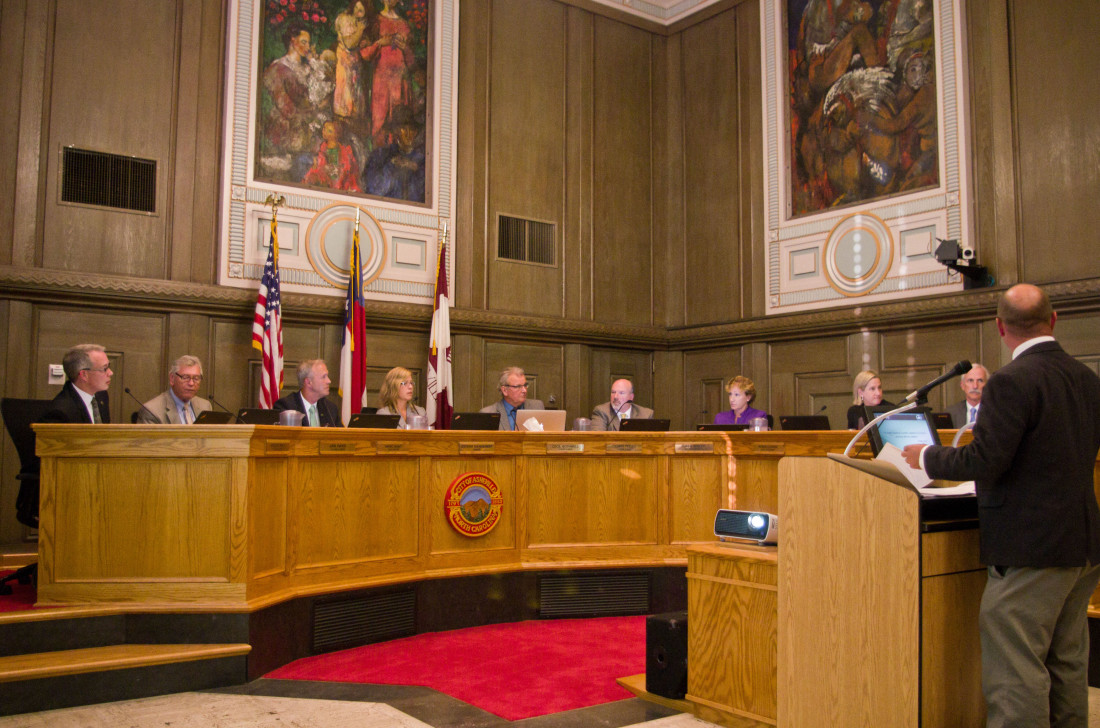Asheville Council members extended a graffiti-cleanup initiative and approved $250,000 to fund burying power cables for a residential/commercial project on S. Lexington Avenue. Council member Cecil Bothwell was the lone “nay” vote on both items and said he was “totally ticked” about another issue that came up during public comment — the Asheville Police Department’s apparent practice of filming local protests and protesters.
Speaking during the public-comment period of the three-hour meeting, Asheville resident Jonathan Robert asked the Council to “rein in the APD” and said the department’s filming of Mountain Moral Monday protests violated Asheville’s civil liberties resolution. (Earlier this summer, Robert filed a complaint about the APD’s recording of local protests, the Asheville Citizen-Times reported.)
This sparked a fiery oratory (one of two) from Bothwell. Describing himself at turns as “mad,” “pissed” and “ticked,” Bothwell said that he had focused much of his first term on passing that civil-liberties resolution, which was being so flagrantly violated: “That was my main issue. It was a campaign promise I made when I began to run for office, and I am ticked, I am really, really ticked, and I intend to see something happen.”
In October 2013, Council had unanimously adopted the resolution, which, Bothwell said at the time, “calls for protecting civil liberties and strengthening community-police relations by adopting a policy that prohibits discrimination and profiling based on race, immigration status, sexual orientation, mental or physical disability, ethnic origin, gender, religious or political affiliation, and homed or homeless status.” Bothwell had been working on getting the resolution adopted since 2009, saying it “protects residents and businesses who are not under criminal investigation from having information about their social, political, or religious views and activities collected, maintained, or distributed by City officials.”
It’s not clear what effect the resolution should have on the APD’s filming practice, however. Council member Gordon Smith asked City Manager Gary Jackson to work on “some kind of understanding of the policy going forward.”
More time for graffiti project
In less controversial action, Council passed 6-1 a motion extending its graffiti-removal initiative, which had been slated to end Oct. 1. Public Works Director Greg Shuler reported that while the city had cleaned up 141 incidents of graffiti, it had only used about 12 percent of the $300,000 allotted. Shuler also mentioned that between 10-20 known sites need extensive cleanup that could cost about $10,000 each. He recommended bringing these projects to Council for review at a later date.
Council’s vote extends the city’s offer of a one-time, $500 contribution to cleanup projects “during the first year of the ordinance or until [the city] hits [the] cap.”
Bothwell, the lone no vote, said he’d rather spend the money to “incentivize” affordable homes, and he questioned “spending tax money … to paint over someone’s idea of art.” He asked, “Why are we spending tax money on private property to clean things up? When I look at these pictures, most of those look like art to me. … I know it’s a crime, but if it’s on private property, we need to somehow totally incentivize the cleanup.”
Yes to assistance for 56 S. Lexington project
On a 6-1 vote (Bothwell opposed), Council committed $250,000 to help fund the burial of power lines on 56 S. Lexington Ave. for a new development proposed by Public Interests Project.
There could be no building on the site of any kind unless the lines were buried, said Pat Whalen, PIP’s director. If the project — planned a few years ago but delayed in part due to the recession — could not be completed, PIP would pay that amount back to the city, said Whalen. Whalen declined to make a firm commitment to keeping the rates of the living spaces at workforce levels, as requested. “I’m not willing to committ to workforce rents right now,” he said. “I want you to trust me, based on our history.”
Council has pushed developers to include affordable and workforce housing in residential projects. On Aug. 26, Council postponed a decision on a Sardis Road plan when the developer expressed concerns about the requirement. Council asked the developer to reconsider, work with staff on figuring out a solution and come back in October.
Airport business
Council unanimously approved a motion to apply to the Federal Aviation Administration for approval of a plan to transfer property and operations of the airport to its re-organized board, the Greater Asheville Regional Airport Authority. In 2011, state legislators mandated that Asheville cede ownership and that the airport board increase the number of Henderson County representatives.
Action agenda
Council also approved numerous items on its consent agenda. The full “action” report is here.




Here is a thought regarding Gordon Smith’s desire to have the City Manager work on “some kind of understanding of the policy going forward…” related to videotaping of peaceful gatherings by the APD: remind them that Americans have a constitutional right of free assembly and lawful protest and to cease and desist with their efforts at intimidation of participants, and to discontinue claiming that they need to videotape these lawful assemblies in order to collect ‘criminal intelligence’. They have no right or legitimate reason to engage in this practice. The City should reign them in pronto.
For more on the APD video issue, listen to my 20 minute 9/8/14 interview with Cecil Bothwell on Making Progress: News for a Change (time: 2:40):
http://bit.ly/1wdxn16